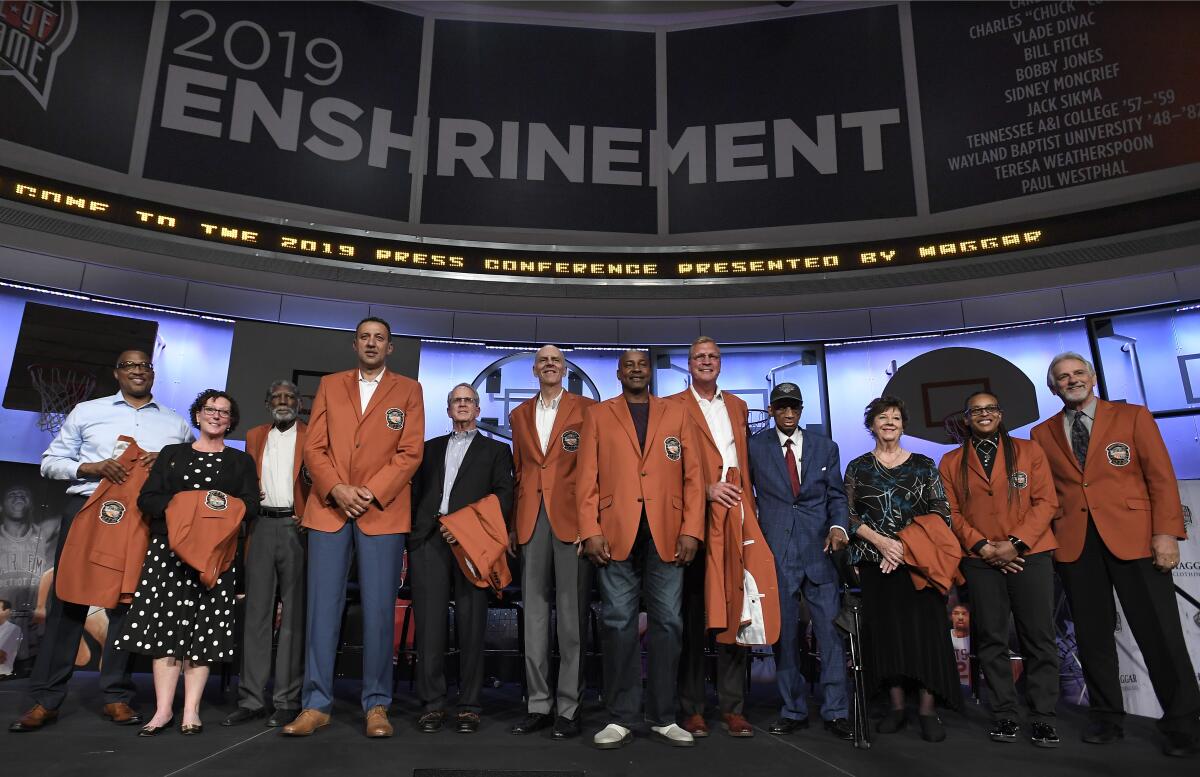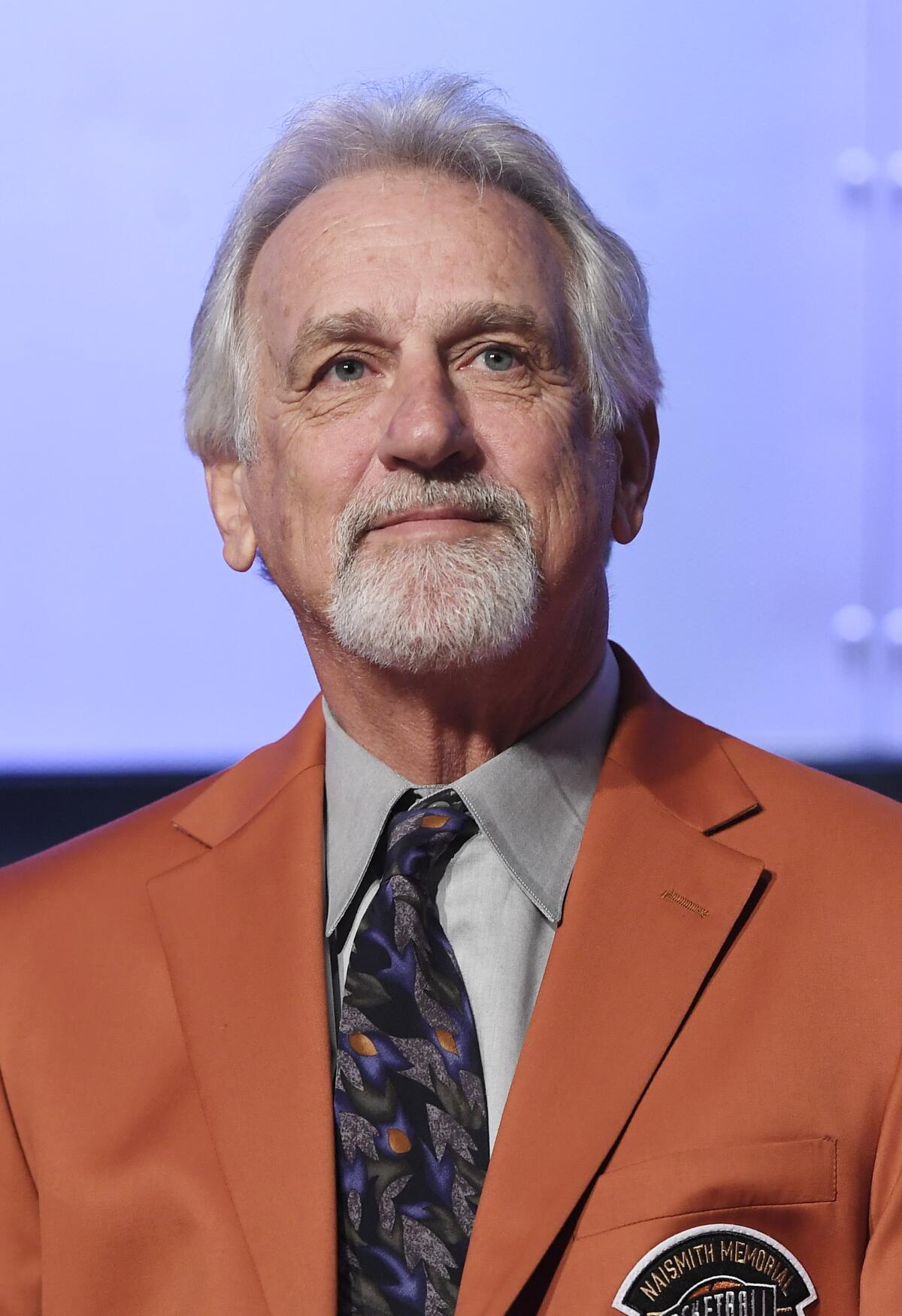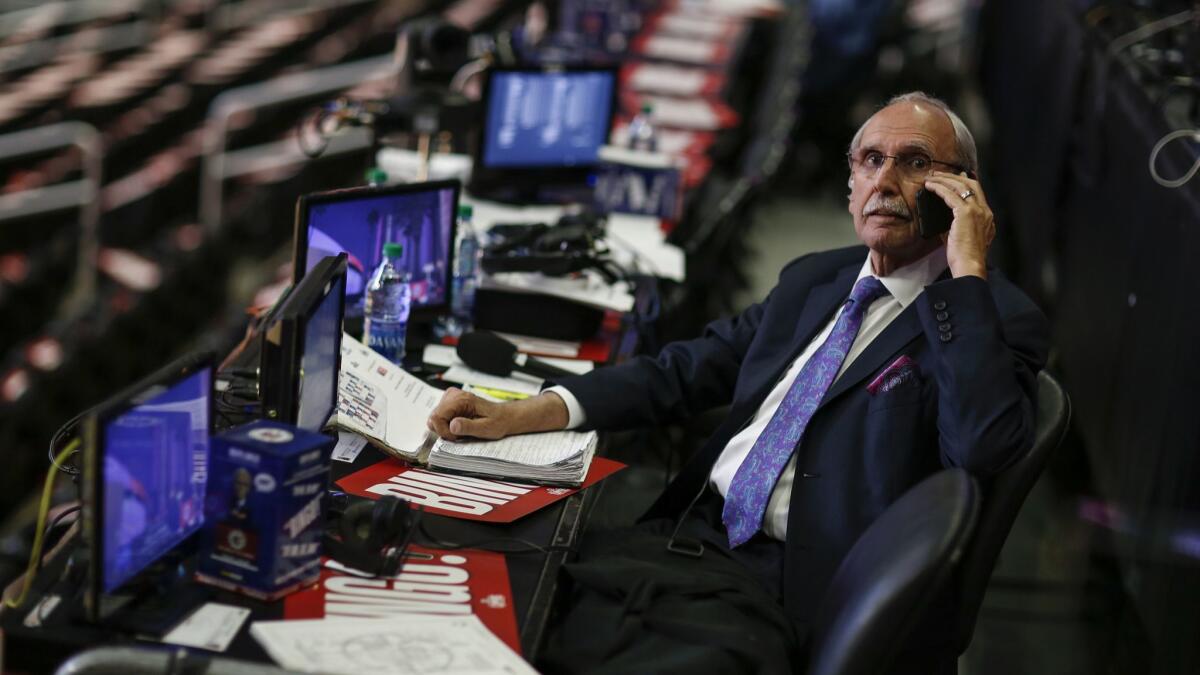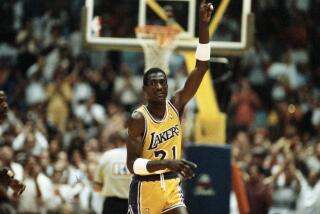Paul Westphal and Ralph Lawler took different paths to the Hall of Fame

- Share via
The path could’ve taken then-prep star Paul Westphal to UCLA, where he would’ve won championship after championship. It could’ve kept him in Boston after the Celtics groomed him to be next in line for a spot in their starting backcourt.
That was probably the clearer path to the Basketball Hall of Fame, the most direct line to Springfield, Mass.
For the record:
12:42 p.m. Sept. 6, 2019An earlier version of this column referred to the Duke Blue Devils having multiple Hall of Famers. Grant Hill became the first Duke player inducted in 2018.
But with the ex-USC star Westphal, Clippers broadcaster Ralph Lawler and former Laker center Vlade Divac all set for enshrinement this weekend, those who walked down alternate paths are getting their routes validated.
“Life is unpredictable. There are a lot of different ways it can take you,” Westphal said with a laugh Thursday morning. “I think all of us were just trying to do the best we could. And you just followed the road that you had.”
Westphal was a dominant guard for Aviation High School in Redondo Beach at a time when all great players, seemingly, ended up as Bruins, helping UCLA run through all of college basketball.
The Bruins and coach John Wooden won four of the last five national titles when it was time for Westphal to pick a school. But his desire to topple a dynasty in his backyard – instead of joining one – led to him picking USC.
“There was no reason to leave Los Angeles. It was just a decision where I don’t think I could’ve made a wrong decision, but I still had to make one. And I guess the bottom line was that I felt if we could win at ‘SC, it’d be a bigger deal than winning at UCLA – because UCLA was always winning. It was just the challenge of it,” Westphal said.

“… It was about building the team that could challenge a dynasty. It was the biggest challenge in college basketball – and it was invigorating.”
His USC teams beat UCLA only once in three seasons with Westphal on the court, but he was able to make a name for himself outside of the Bruin shadow, earning All-American honors while leaving campus as the school’s fifth-best scorer to that point.
As a pro, though, he got a quick taste of life with a dynasty after being picked in the first round by the Boston Celtics. He won a title in his second year and emerged as one of Boston’s most valuable reserves in his third season before he was dealt to Phoenix for future Hall of Famer Charlie Scott.
With the Suns, Westphal became a star, making three All-NBA first teams and four All-Star Games. He would later be traded for another future Hall of Famer, Dennis Johnson, and have another All-Star season in Seattle.
He would eventually coach the Suns all the way to the NBA Finals – a door that might not have ever opened had he not been traded to Phoenix from the Celtics.
And who knows how differently life would be for Divac – and Laker fans – if he weren’t put onto a less conventional path to the Hall. After becoming one of the NBA’s best young centers with the Lakers – a franchise known for having great big men – he was traded for a late lottery pick in the 1996 NBA Draft, a pick the Lakers used on Kobe Bryant.
Outside of the Lakers, Divac continued to be a premiere big man, most notably with the Sacramento Kings where he’s now the general manager. Without being the bait that landed Bryant, who knows how Divac’s career would’ve played out?
And then there’s Lawler, who developed his litany of catchphrases narrating the Clippers of all teams – a job that meant he’d have to ignore the score and find something else to focus on. It was an adjustment for Lawler, who was very much a classical broadcaster, but a partnership with Bill Walton helped free things up.

“Walton helped me realize we had some really bad teams. And we had some of our highest TV ratings,” Lawler said. “… Bill made me realize that this was about having fun … It was a little bit liberating.”
And that helped Lawler become a beloved Clippers’ representative regardless of the wins or losses. Lawler, who retired after the 2018-19 season, received his Curt Gowdy Award for electronic media and entered the Hall of Fame Thursday night.
“Here I am (last season), an 80-year-old broadcaster going on 81, and I had so many young – I mean, 8, 10, 15, 18, 20-some year-old fans, that said they are fans because having listened or watched this old codger and they’re relating,” Lawler said. “That means I’ve been doing something right.”
The Hall of Fame is littered with players who won iconic games for the basketball’s iconic teams. It’s full of Celtics and Lakers, North Carolina Tar Heels and UCLA Bruins. But it’s filled out with players like Westphal and Divac and people like Lawler because everybody can’t take the most obvious path to Springfield.
And basketball is better for it.
More to Read
Go beyond the scoreboard
Get the latest on L.A.'s teams in the daily Sports Report newsletter.
You may occasionally receive promotional content from the Los Angeles Times.










